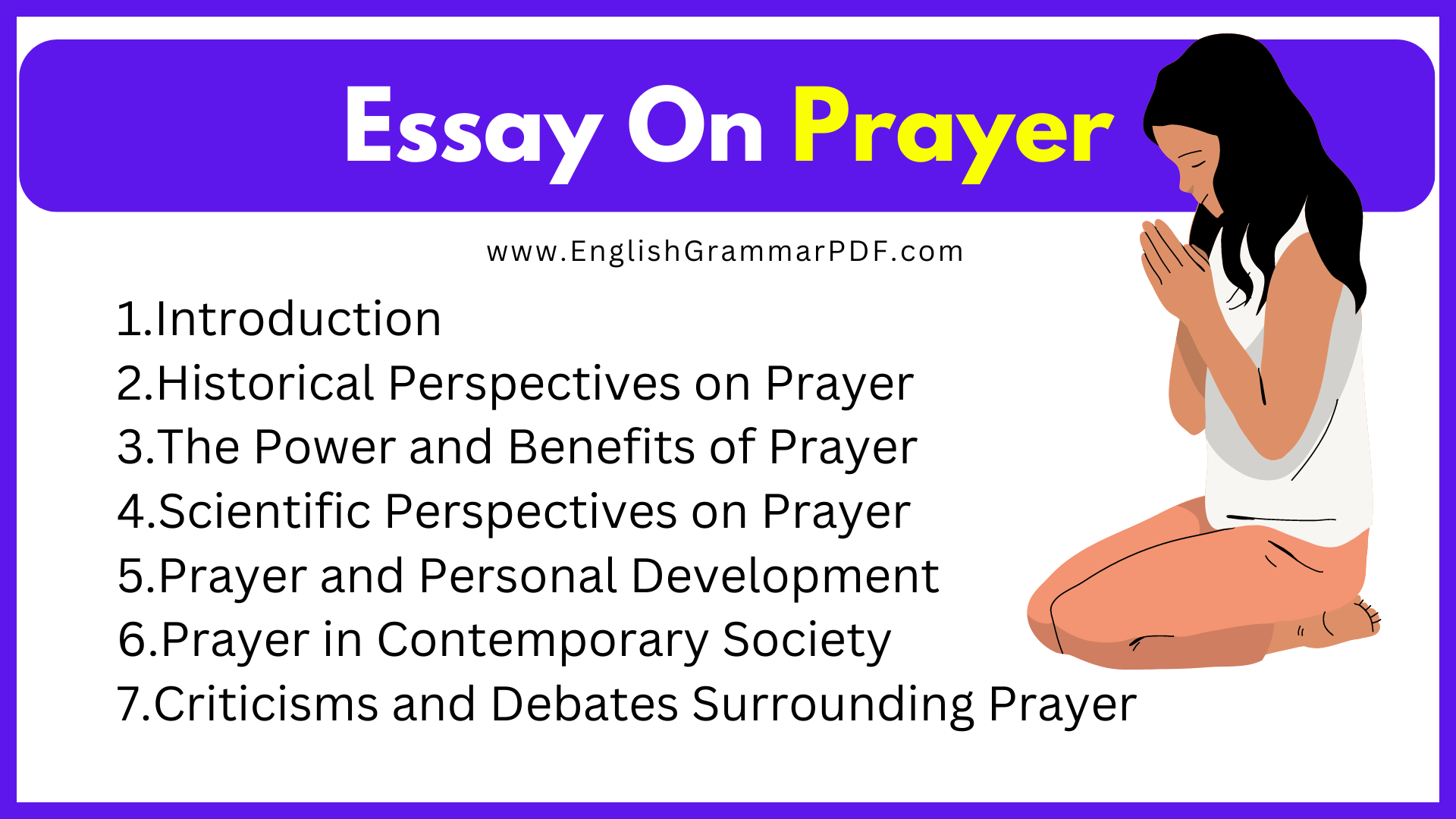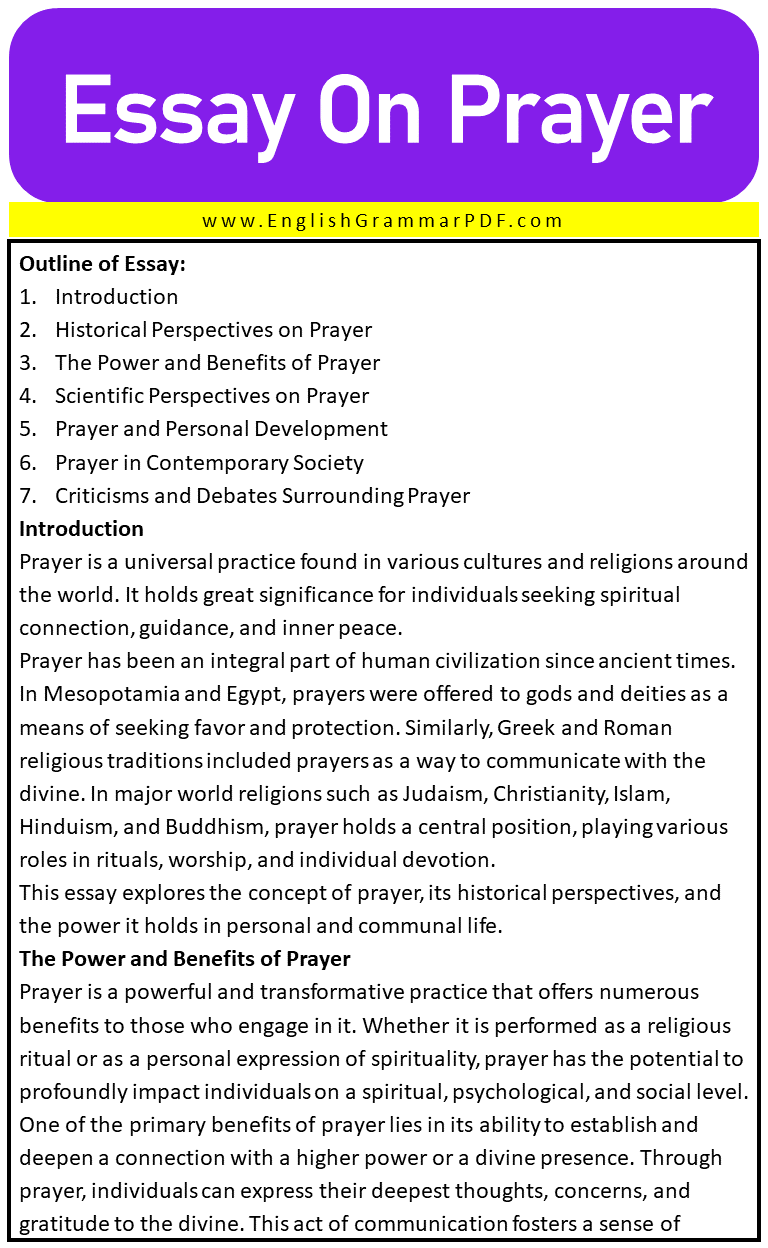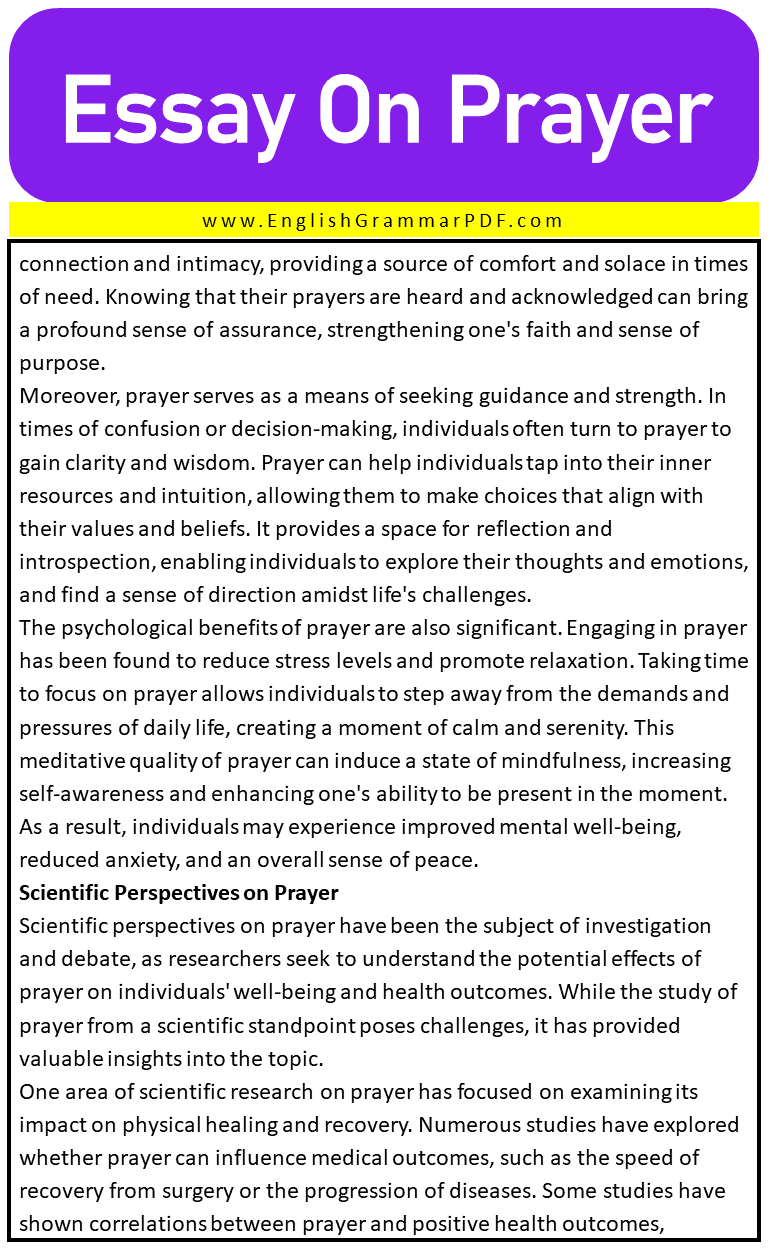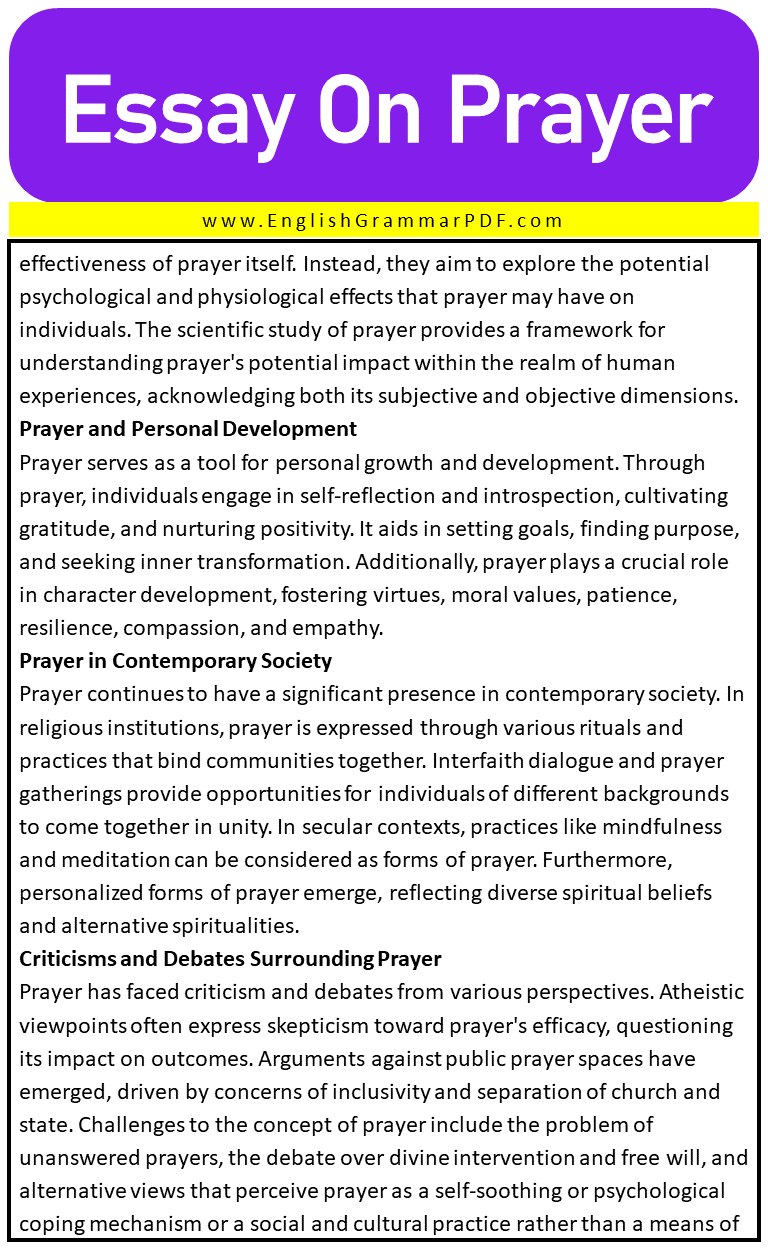Short Essay On Prayer
Outline of Essay:
- Introduction
- Historical Perspectives on Prayer
- The Power and Benefits of Prayer
- Scientific Perspectives on Prayer
- Prayer and Personal Development
- Prayer in Contemporary Society
- Criticisms and Debates Surrounding Prayer
Introduction
Prayer is a universal practice found in various cultures and religions around the world. It holds great significance for individuals seeking spiritual connection, guidance, and inner peace.
Prayer has been an integral part of human civilization since ancient times. In Mesopotamia and Egypt, prayers were offered to gods and deities as a means of seeking favor and protection. Similarly, Greek and Roman religious traditions included prayers as a way to communicate with the divine. In major world religions such as Judaism, Christianity, Islam, Hinduism, and Buddhism, prayer holds a central position, playing various roles in rituals, worship, and individual devotion.
This essay explores the concept of prayer, its historical perspectives, and the power it holds in personal and communal life.
The Power and Benefits of Prayer
Prayer is a powerful and transformative practice that offers numerous benefits to those who engage in it. Whether it is performed as a religious ritual or as a personal expression of spirituality, prayer has the potential to profoundly impact individuals on a spiritual, psychological, and social level.
One of the primary benefits of prayer lies in its ability to establish and deepen a connection with a higher power or a divine presence. Through prayer, individuals can express their deepest thoughts, concerns, and gratitude to the divine. This act of communication fosters a sense of connection and intimacy, providing a source of comfort and solace in times of need. Knowing that their prayers are heard and acknowledged can bring a profound sense of assurance, strengthening one’s faith and sense of purpose.
Moreover, prayer serves as a means of seeking guidance and strength. In times of confusion or decision-making, individuals often turn to prayer to gain clarity and wisdom. Prayer can help individuals tap into their inner resources and intuition, allowing them to make choices that align with their values and beliefs. It provides a space for reflection and introspection, enabling individuals to explore their thoughts and emotions, and find a sense of direction amidst life’s challenges.
The psychological benefits of prayer are also significant. Engaging in prayer has been found to reduce stress levels and promote relaxation. Taking time to focus on prayer allows individuals to step away from the demands and pressures of daily life, creating a moment of calm and serenity. This meditative quality of prayer can induce a state of mindfulness, increasing self-awareness and enhancing one’s ability to be present in the moment. As a result, individuals may experience improved mental well-being, reduced anxiety, and an overall sense of peace.
Scientific Perspectives on Prayer
Scientific perspectives on prayer have been the subject of investigation and debate, as researchers seek to understand the potential effects of prayer on individuals’ well-being and health outcomes. While the study of prayer from a scientific standpoint poses challenges, it has provided valuable insights into the topic.
One area of scientific research on prayer has focused on examining its impact on physical healing and recovery. Numerous studies have explored whether prayer can influence medical outcomes, such as the speed of recovery from surgery or the progression of diseases. Some studies have shown correlations between prayer and positive health outcomes, suggesting that prayer may play a role in promoting healing. However, it is essential to note that the results of such studies are often inconclusive and vary in their findings.
Experimental investigations have also been conducted to assess the potential effects of prayer on individuals’ subjective experiences and well-being. These studies often involve participants engaging in prayer or being prayed for, while researchers measure various psychological variables such as mood, stress levels, and overall well-being. While some studies have reported positive effects of prayer on these subjective measures, other studies have found no significant impact or even conflicting results. These discrepancies highlight the complexities of studying prayer scientifically and the challenges of quantifying its effects.
Despite efforts to examine the effects of prayer scientifically, controversies and limitations persist. Methodological challenges present one of the primary difficulties in conducting prayer research. Designing rigorous experiments that adequately control for variables and account for potential biases poses significant obstacles. Additionally, ethical considerations arise, such as the inclusion of prayer in medical interventions or the potential exploitation of vulnerable populations. These challenges contribute to the ongoing debates surrounding the scientific study of prayer.
Interpreting conflicting research findings is another area of contention in the scientific study of prayer. Some researchers argue that the variability in study results could be attributed to the complexity and personal nature of prayer. Factors such as an individual’s faith, intention, and personal beliefs may influence the outcomes of prayer studies. Furthermore, the diverse ways in which prayer is practiced across different religions and cultures can make it challenging to generalize findings or draw definitive conclusions.
It is crucial to acknowledge that scientific perspectives on prayer do not seek to prove or disprove the existence of a higher power or the effectiveness of prayer itself. Instead, they aim to explore the potential psychological and physiological effects that prayer may have on individuals. The scientific study of prayer provides a framework for understanding prayer’s potential impact within the realm of human experiences, acknowledging both its subjective and objective dimensions.
Prayer and Personal Development
Prayer serves as a tool for personal growth and development. Through prayer, individuals engage in self-reflection and introspection, cultivating gratitude, and nurturing positivity. It aids in setting goals, finding purpose, and seeking inner transformation. Additionally, prayer plays a crucial role in character development, fostering virtues, moral values, patience, resilience, compassion, and empathy.
Prayer in Contemporary Society
Prayer continues to have a significant presence in contemporary society. In religious institutions, prayer is expressed through various rituals and practices that bind communities together. Interfaith dialogue and prayer gatherings provide opportunities for individuals of different backgrounds to come together in unity. In secular contexts, practices like mindfulness and meditation can be considered as forms of prayer. Furthermore, personalized forms of prayer emerge, reflecting diverse spiritual beliefs and alternative spiritualities.
Criticisms and Debates Surrounding Prayer
Prayer has faced criticism and debates from various perspectives. Atheistic viewpoints often express skepticism toward prayer’s efficacy, questioning its impact on outcomes. Arguments against public prayer spaces have emerged, driven by concerns of inclusivity and separation of church and state. Challenges to the concept of prayer include the problem of unanswered prayers, the debate over divine intervention and free will, and alternative views that perceive prayer as a self-soothing or psychological coping mechanism or a social and cultural practice rather than a means of communication with a higher power.
FAQ’s
How is prayer important in life?
Prayer is important in life as it provides a means of connecting with a higher power, offering solace, guidance, and a sense of inner peace. It helps individuals cultivate gratitude, find purpose, and develop personal and spiritual growth.
Why is prayer powerful?
Prayer is considered powerful because it has the potential to bring about spiritual, psychological, and social benefits. It provides individuals with a sense of divine guidance, strength, and comfort. Prayer promotes stress reduction, increased mindfulness, and improved mental well-being. It also fosters unity, empathy, forgiveness, and acts of kindness within communities.
Explore More Essays:
Essay On Suicide Among Teenagers
Download the PDF of the Essay:








